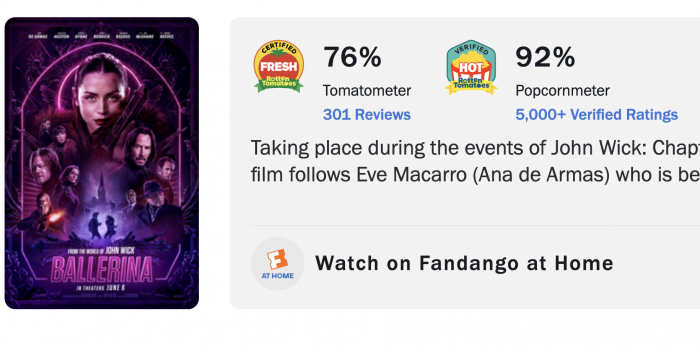By Dustin Rowles | Film | September 5, 2025

Most of you may already know this, but film criticism is dying. The Chicago Tribune, where Siskel and Ebert originated, fired its chief film critic over the summer, and Vanity Fair did, too. For a lot of folks, Richard Lawson was the only reason left to read Vanity Fair, unless you’re into getting inside info on Jared Kushner and Ivanka Trump from Vanity Fair’s inside sources, Jared Kushner and Ivanka Trump.
But on the other hand, film criticism … is not dying? There were 389 critic reviews for Jurassic World this summer. There are 3,500 Tomatometer-approved critics! When I started writing reviews back in 2000 dickity-dick, there were only 140 critics on Rotten Tomatoes. You could only apply during a short window each year, you had to write 50 reviews annually, and you needed a reference from a U.S. Senator (OK, maybe not that last part). A small board of critics voted on your application, and after four or five tries (while hearing some of those same critics talk sh*t about how self-righteous Pajiba was in the early years —- not wrong!), I finally gave up, telling myself, “Any club that would want me is not a club … yadda yadda yadda.”
And then basically the next year, they just … let me in. I didn’t ask. I didn’t apply. I didn’t offer my first-born son. They just started including my reviews. It was nice! Although, once I got in, I realized it didn’t mean much for exposure. People just look at the score. No one clicks on those links. I’m just part of a percentage.
And those percentages have been climbing over the last decade. In writing about Rotten Tomatoes on Puck this morning, Matt Belloni noted that between 2014 and 2024, the average RT score spiked 13 points. Thirteen points! I guess Rotten Tomatoes scores have risen right alongside inflation.
As someone writing reviews in both 2014 and 2024, let me tell you: Movies have not gotten nearly 15 percent better overall. I’ll grant that they’re less bad, because the algorithm has a floor, but they’re also less good, because the algorithm has a ceiling. So why would the average RT score rise 13 points in a decade?
I’m glad there’s data to back this up, because I’ve definitely noticed. And not just in the very early reviews, where studios give access only to critics they know will love their movies — since if they don’t, they won’t get invited to the early screenings — and then quickly publicize the RT score before the rest of the crowd brings it back down to earth. But it’s also in the overall scores, after everyone has weighed in. As David Remnick suggested in The New Yorker this week: Are critics too nice?
I mean, uh, yes? Granted, we’re nicer here than we were during our scathing, bitchy-review days, but that’s only because most of us don’t hate ourselves as much. But we still sh*t on movies. We just stopped coming up with creative ways to torture filmmakers in reviews sometime around 2008. We’re still critical! Just not as harsh.
A lot of it is still about access. There are now 3,500 accredited RT critics, and they want to be invited to screenings. As I learned at Sundance one year, they won’t invite you if you’re mean to filmmakers — which is fair. You shouldn’t take personal shots. (I was young(er)!) But as Belloni notes, the studios really have rigged the Rotten Tomatoes game. There may be 3,500 critics, but a blockbuster still only gets around 300 reviews, while a smaller film may only get 10 to 50. That makes it easier for studios to game the system. As of 2018 (and the disparity is almost certainly bigger now), there were six publicists for every journalist. And it’s their job to get favorable coverage, and they have the resources and manpower to procure it.
And that’s why movies are “13 percent” better in 2024 than a decade ago. Not because they’re actually better, but because there are more critics and, overall, they’re a lot nicer (and in many cases, incentivized to be nicer). In other words, take Rotten Tomatoes with a grain of salt. Or find a critic you align with, or even disagree with. (One of my favorites is someone I usually disagree with, which is to say: If she doesn’t like it, there’s a good chance I do.) The RT grading system is already specious (if a critic likes something slightly more than they dislike it, it still counts as 100 percent), so maybe don’t put all your faith in those silly percentages. Was the John Wick spin-off Ballerina really worthy of a 76 percent RT score? Or was it closer to 63?
(FWIW: There are very few fireable offenses at Pajiba, but being disingenuously generous in reviews is definitely one of them.)